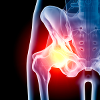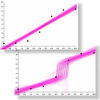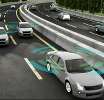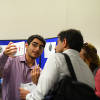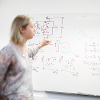Research articles
Research carried out by the University of Oxford's staff, students and alumni has made an enormous impact on the world over the centuries. You can explore below some of the more recent examples of how our community of computer scientists have contributed to areas such as artificial intelligence, the environment and health.
Inspired Research is the twice-yearly newsletter published by the Department of Computer Science. Click here to download the latest magazine.
Hip surgery guide
With an ageing population, arthritis is an urgent research topic. The department's Medical Imaging Group led by Irina Voiculescu has been developing software to improve support for early diagnosis and intervention, and to print 3D models to guide surgeons when preparing for hip replacement surgery. An early diagnosis helps clinicians reduce the duration of pain suffered by patients as hip osteoarthritis progresses.Who's storing your conversations?
It may feel like chatting with Alexa and Siri is fairly innocuous, but it can be disconcerting to know that your conversations are stored somewhere beyond your control. A research team from the department is investigating how to make virtual assistants more respectful through a combination of technical and social techniques. DPhil student William Seymour explains.What do Angry Birds know about your children?
When evaluating games for children to play on mobile devices, parents tend to focus on content, rather than information gathered. Yet these apps track a notable amount of information, prompting an Oxford team to work on increasing parents' and children's awareness of privacy issues, as Senior Researcher Jun Zhao explains.Unravelling the complexities of AI in a team
The key to enabling several artificial intelligence (AI) entities to collaborate is for them to act independently but be trained centrally, according to a University of Oxford team. DPhil students Jakob N Foerster and Gregory Farquhar describe a method developed by computer scientists and engineers which could make it possible to deploy learning multi-agent systems in the real world.AI start-up tackles sophisticated data analysis
Artificial intelligence (AI) systems that can reason about and query large amounts of knowledge provide basic building blocks of many advanced data management applications. Three professors from the department have launched a spin-out, Oxford Semantic Technologies, with the aim of applying this technology to data integration and analysis.Building a better IT future
In a world where technological advances can create undesirable futures, there is an ever stronger need for more research into the ethical and societal consequences of technology. Responsible research and innovation is a way of achieving more desirable futures, as outlined below by Margherita Nulli, ORBIT Project Officer.Flight simulator evaluates cyber-attack reactions
Did you know that there's a flight simulator in the department's Robert Hooke Building? DPhil student Matt Smith describes how the computer scientist team is using it to evaluate flight crew response to cyber-attacks.Realistic data models for large-scale probabilistic knowledge bases
Systems that crawl the web encountering new sources and adding facts to their databases have a huge amount of potential uses. However, a lack of common-sense knowledge about their stored data is currently limiting their potential in practice. Oxford researchers are working to overcome these constraints, as Professor Thomas Lukasiewicz and co-investigator Ismail Ilkan Ceylan explain.Complex statistical methods benefit from probabilistic programming
New ways of understanding and building basic structures in statistics and machine learning is the research area of Professor Sam Staton, a Royal Society University Research Fellow. In this article he explains his work into understanding what a probabilistic program means as a mathematical structure.Will quantum computing make the world better?
Quantum computing has the potential to transform a whole host of technologies, from cryptography to artificial intelligence (AI). To help ensure these changes are positive for society, Oxford researchers are aiming to embed responsible research and innovation in quantum projects, as researcher Philip Inglesant explains.Oxford showcases its strengths in AI
The first ever expo on artificial intelligence (AI) at the University of Oxford showcased the tremendous advances being made in the field, and looked at where Oxford’s research is likely to lead. The AI@Oxford event brought together researchers from across the collegiate University, highlighting their expertise through a series of talks, debates, and demonstrations. Head of the Department of Computer Science Professor Mike Wooldridge reviews the event.Why computer simulations should replace animal testing for heart drugs
Dr Elisa Passini, Professor Blanca Rodriguez and Dr Patricia Benito from the Department of Computer Science look at why computer simulations should replace animal testing for heart drugs in an article first published by The Conversation.Are we safe in self-driving cars?
The safety of self-driving cars relies on the accuracy of the deep neural networks that control them. To verify the performance of these networks, the department is developing model checking techniques, as Professor Marta Kwiatkowska explains.Defining trust helps robots behave
An important step in making sure that robots act safely and effectively in our society is to be able to formally express what trust is in a human-robot partnership. The University of Oxford is working on how to express the properties of trust, writes researcher Morteza Lahijanian.Rocky ethical territory to traverse to reach AI code
How people relate to intelligent machines is one of the complicated questions to solve in work to develop ethical codes for Artificial Intelligence (AI) research. Senior Researcher Paula Boddington describes work currently in progress, potential pitfalls and opportunities.Strava storm: why everyone should check their smart gear security settings before going for a jog
The security and privacy risks associated with wearable gadgets and other Internet of Things devices are highlighted in this article (first published in the Conversation) by Jason RC Nurse, Senior Researcher in the Department of Computer Science.Mike Wooldridge speaks on AI at The House of Lords
Professor Michael Wooldridge describes his experience giving evidence to the House of Lords Select Committee on Artificial Intelligence.Tackling the blight of fake news
Professor Marina Jirotka and Senior Researcher Helena Webb consider what can be done by government and social media platforms to tackle the problem of fake news.Badgers bridge territorial borders
A clearer understanding of badgers' territorial habits give vital clues to the likely effectiveness of badger culls. By introducing different technology to collect tracking data, an interdisciplinary team from Oxford and Cambridge has gleaned important new insights into badgers’ potential interactions.App users need protecting from aggregation of permissions
To help speed up code writing, many app developers use common libraries, but this can result in such libraries getting access to significant privileges on a device. DPhil student Vincent Taylor describes the problem and his research in the area.Stingray detectors provide little protection
A research team from the University of Oxford and the Technical University of Berlin evaluated the capabilities of five IMSI catcher detector apps for Android devices.Automated verification and validation
Defence, aerospace and automotive embedded software.Project: D-RisQ.
Beyond the world wide web
Research at the University of Oxford aimed at enabling computers to understand and respond to complex human requests will underpin the next-generation world wide web and is already in use by GPs.Project: DBOnto: Bridging Databases and Ontologies.
Chips with confidence
The University and Intel Corporation have developed new methods to check that electronic chips do what they’re meant to do, before they are manufactured.Climate Prediction
A technology to enable secure volunteer computing in supporting international climate modelling.Project: BioniC
Computers at the heart of the matter
Computer scientists at the University of Oxford are developing a way to predict which new drugs could cause heart problems.Project: PreDIC
Ontology
Changing environmental circumstances and new energy-saving ideas.Project: HermIT
PRISM: Probably the best device checker in the world
A software tool developed at the University of Oxford is making computer-controlled devices and designs more reliable.Project: Prism
Robots set new goals
Participating in the 'Robot World Cup' is helping University of Oxford researchers create technology that will fashion our future.Project: Robot Football
Safety by design
Analytical tools developed at the University of Oxford play vital roles in safety-critical and secure systems.Project: Verum
Securing data with database firewalls
Protecting databases from internal and external attack.Project: Secerno
Semmle
A powerful query language for analysing large data sources.Project: Semmle
The Origami of Life
DNA origami is a technique that is used to create nanometre–scale shapes by folding strands of DNA.Project: Microsoft Research studentship & Veriware

